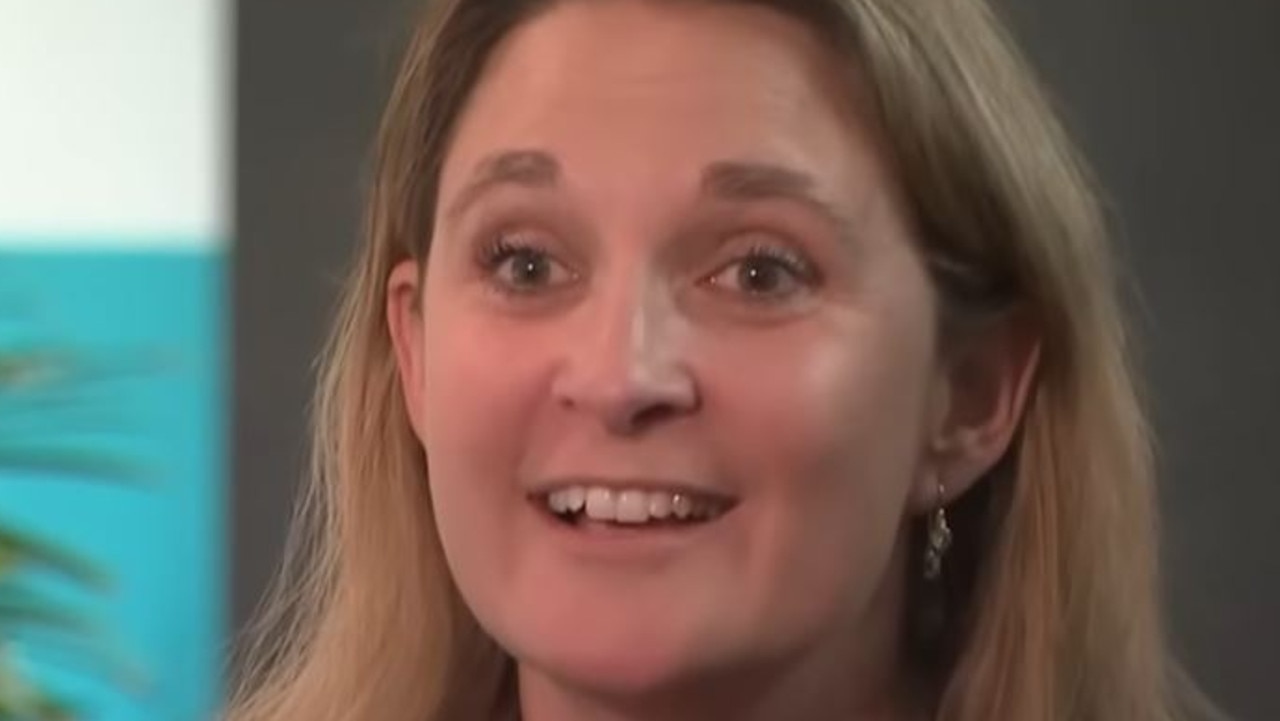Smirking and laughing while taking a dig at a devastated small business owner was likely not the response Australians expected from the boss of Optus on the day its network collapsed.
But that’s precisely what chief executive officer Kelly Bayer Rosmarin did, marking the beginning of the end of her reign at the country’s second-largest telecommunications company.
Shortly after 4am on Wednesday, November 9, the Optus network collapsed and left more than 10 million Australians without telephone and internet access, with the devastating consequences stretching to train services, banks and even triple-0 services.
It was two-and-a-half hours before the telco finally issued a public statement at 6.30am acknowledging the problem, with only scarce updates provided after that.
Some 13 hours on from the outage, almost all customers had their services restored and Ms Bayer Rosmarin emerged for the first time that day, hastily beginning an apology tour via multiple media outlets.
It was during one of those attempts at redemption that one expert believes she sealed her fate, finally announcing her immediate resignation on Monday.
But there were plenty more jaw-dropping reasons for the former CBA executive to leave over the following days.
Poking fun at customers
In a moment when Ms Bayer Rosmarin should’ve been contrite, reassuring and resolute, the Optus boss was defensive, dismissive and even demeaning.
A severe “low point” for the Optus chief was when she appeared to belittle a customer whose small business was impacted by the outage, public relations expert Phoebe Netto said.
Jake Azar, manager of North Sydney Barbers, was one of 400,000 businesses affected during the outage, unable to process EFTPOS transactions or take telephone bookings.
After Mr Azar spoke out about the consequences in the media, Ms Bayer Rosmarin sensationally fired back at him directly in an interview with Nine News.
“I’m disappointed that a barber couldn’t do haircuts today,” she said, smirking and laughing. “That seems like one of the few things you can do without connectivity.”
When vision if the remark went viral, Ms Bayer Rosmarin was slammed for being “out of touch” and “beyond a joke” on social media.
Ms Netto, who’s the managing director of Pure Public Relations in Sydney, said instead of “showing empathy for the experience of customers, she completely gas lighted [them] and trivialised their experience”.
“With that single offhand comment, she proved just how out of touch she was with the struggles of small businesses,” Ms Netto said.
“She clearly doesn’t understand the sympathy that people have towards small businesses in Australia, and the picture is very much of the CEO in her ivory tower.”
Ms Bayer Rosmarin initially brushed off suggestions that the company should compensate its customers who’d incurred losses as a result of the outage.
Eventually she softened her stance – but only a smidgen.
Salt was rubbed into the wounds of frustrated customers when Optus revealed how it would make good with those who had been cut off.
She announced a 200GB data bonus would be applied, working out to about $100 per customer, which was overwhelmingly seen as an inadequate peace-offering.
“For businesses that have lost hundreds if not thousands of dollars, ‘more data’ is simply not good enough,” Ms Netto said.
Making matters worse, accessing the offer is far from straight forward, and some customers aren’t eligible at all.
“So when people go to access it – if anyone can be bothered – it’s most likely going to exacerbate the frustrations they already had.”
Ben Fordham, host of 2GB’s breakfast program, described the offer as “lame” and his listeners agreed, savaging the paltry compensation.
Heavy-handed spin doctors
When Ms Bayer Rosmarin arrived at Parliament House in Canberra on Friday to appear before a Senate committee probing the outage, a news crew was unsurprisingly waiting outside.
Instead of walk in with her head held high, two of her media advisers rushed forward and attempted to block the camera’s view of their boss.
One spin doctor grinned as he shoved his hand over the lens. He was followed by a colleague who also tried to shield the Optus chief from view.
Ms Netto said it came off “a little too A Current Affair” and as such reduce the CEO “to the same status as a conman plumber”.
Hours later as she left parliament, Ms Bayer Rosmarin did so with an extraordinary police and security presence, with one reporter pushed aggressively while approaching her.
Again, Ms Netto said the optics were appallingly bad.
“Optus needed to be seen as a respectable company that is confident and in control, showing up to have a constructive conversation as the industry leaders they supposedly are.
“Instead, she left surrounded by police and security to avoid answering questions from news reporters – a rather strange look for a company insisting on its transparency.”
Far from front-and-centre
For the 13 hours that 10 million Optus customers were disconnected from the digital world, Ms Bayer Rosmarin was missing in action.
At least that was the public perception, with no media appearances from the top dog to explain what had gone so wrong or when a resolution might be found.
“Optus’ wall of silence made the general public feel like they’d been ghosted,” Ms Netto said.
“Even if Optus had proactively given relevant updates on its website and social media channels every 15 minutes, it would have been able to gain more control of the story and reduce customer frustration.”
Ms Bayer Rosmarin defended her deafening silence that day during the heated Senate appearance, saying it would have been “unusual” for her to be public-facing.
“It’s actually unusual for a CEO to appear at all during an outage because the public would expect that my focus is on working with the team to resolve the issue,” she told the Senate.
“Our communications team was giving updates to the media fielding questions, and the team had the view at the time that this was being covered widely and all our customers knew what we knew, which is that the network was down, that we were working on it, and that we were very sorry.”
Ms Netto said the approach was deeply flawed.
“Optus should have held a brief press conference,” she said.
“Even though the information could have been delivered in written talking points, a press conference would have helped bring reassurance that can only come when a leader delivers the information directly to camera and is willing to answer at least some questions.”
On Friday, Senators variously described Ms Bayer Rosmarin’s explanation of the company’s shambolic response as “lousy”, “very, very fluffy” and “[not] on the front foot”.
“This is wearing thin,” Greens Senator Sarah Hanson-Young said. “You’re going to have to cough up, accept responsibility, apologise and cop a penalty.”
She remarked that “for a communications company, you’re not very good at communicating”, summing up the feelings of many.
Company’s bizarre ‘explanation’ slammed
Last Monday, the company attempted to explain what had gone wrong, effectively pushing the blame onto its foreign parent company Singtel.
In essence, a botched routine software update in Singapore led to the meltdown here, it said – although readers of the state released by Optus needed an engineering degree to understand it.
The statement read: “At around 4.05am Wednesday morning, the Optus network received changes to routing information from an international peering network following a routine software upgrade.
“These routing information changes propagated through multiple layers in our network and exceeded preset safety levels on key routers which could not handle these. This resulted in those routers disconnecting from the Optus IP Core network to protect themselves.
“The restoration required a large-scale effort of the team and in some cases required Optus to reconnect or reboot routers physically, requiring the dispatch of people across a number of sites in Australia. This is why restoration was progressive over the afternoon.”
Experts say the statement was as clear as mud.
Mark Gregory, an associate professor in RMIT University’s School of Engineering, said Optus had failed to answer “a number of open questions”.
“The statement is poorly worded,” Dr Gregory said.
“Optus has not explained what went wrong with the test process that should have occurred before the routing software upgrade occurred.
“Also, there is no explanation as to why there appears to have been a lack of redundancy of the key routers, so that if there was a problem the key routers would swap to the redundant routers, which you would expect to be running the previous iteration of software.
“There remains a number of open questions that Optus has failed to explain, but we now know that the Optus outage was not hardware failure and not related to a cyber attack.”
An insider also told The Sydney Morning Herald that the confusing statement sought to absolve Optus of responsibility, but that it was ultimately to blame.
Radio shock jock Ray Hadley declared today that Ms Bayer Rosmarin’s career was over the moment she tried to shift the blame to Singtel.
“When you’re the CEO of Optus in Australia and you start blaming the big bosses in Singapore for the shortcomings of your operation, and you’re wrong … you’re gone,” Hadley told his listeners on 2GB today. “You’re finished. That’s the end of your career.”
Not the first major bungle
The personal data of up to 9.8 million current and former customers was stolen during a cyber attack on the telco in September last year, and once again its communication of the issue was subpar.
For some, the information stolen included passport details, contact numbers, email addresses and dates of birth, which sparked panic. The hacker uploaded more than 10,000 records to the dark web, allowing them to be widely viewed.
Advertising and public relations academic Edwina Luck from the Queensland University of Technology described the approach from Optus as a masterclass in what not to do.
Rather than text or email its customers, Ms Luck explained that Optus chose to issue a press release during a particularly busy news cycle – the middle of the national day of mourning for Queen Elizabeth II, a public holiday, in the frenzied run-up to the AFL Grand Final.
“It has been conventional wisdom that brands should take an integrated approach to marketing communications,” Ms Luck wrote in a piece for The Conversation. “Many channels are better than one, increasingly so as audiences for traditional channels continue to fragment.”
At the time, Melissa Hopkins was Optus’ Chief Marketing Officer. She left last December to head to Seven West Media as Chief Audience and Marketing Officer.
In August, Ms Hopkins spoke at the Association for Data-driven Marketing and Advertising’s Global Forum in Sydney and made a startling admission.
“No one [in marketing] had prepared for this event to happen,” she said of the cyber attack.
Optus should’ve strategically communicated via a multitude of channels trusted and accessed by its customers, Ms Luck said, but it didn’t.
“One of the best channels Optus has is its own phone network, and it is experienced in using it to contact its customers.”
Instead, it relied on a press release to get information out to customers, instead of going to them directly, much to the frustration of those affected.
On top of that, a request by the Federal Government for information on the cyber-attack and data breach was ignored for several days.
Minister for Government Services Bill Shorten said the data request was designed to protect vulnerable Services Australia accounts of those caught up in the breach.
“I don’t know why they’re not on the phone every couple of hours telling us how they’re going, getting the data ready in a form which we can use,” Mr Shorten told reporters at the time.
Cyber Security Minister Clare O’Neil said an email eventually sent by Optus to those whose details were shared on the dark web “was not going to cut it”.
“Optus have advised that they have told those people by email. But that is simply not sufficient under these circumstances,” Ms O’Neil said.
“This is 10,200 people whose data is somewhere in the ether and we don’t know where and we don’t know who has it.”
The hack is said to have ultimately cost Optus $140 million to address.
Off into the sunset
Ms Bayer Rosmarin was appointed CEO in April 2020, a little more than a year after joining the company as its Deputy CEO.
During her time in the top job, she presided over the country’s worst telco outage and its most severe data breach hack. During both, a third of the population was impacted.
Her exit from Optus is effective immediately, with Chief Financial Officer Michael Venter appointed interim CEO while the company “embarks on a global search for a new CEO”.
On the resignation, Ms Netto said: “I’m surprised it took this long.”
But she said the true problem is likely the culture within Optus – not just its top leadership – and ousting the CEO “will only work if you have a great alternative”.
“If you can’t do that, then it will only lead to people being even more disappointed,” she said.
“So, while people might feel a sense of slight jubilation now, they don’t even realise that that’s it’s possible to feel just more disappointed than they already do once the new replacement inevitably struggles yet again to turn the ship around.”
The company’s communications function in particular is a failure, she said.
Case in point, the defensive messaging on the day that “nobody works harder to make sure our customers are looked after”, “we go to great lengths to give our customers great value for money, excellent service and coverage and unique features”, and that “all telcos occasionally have outages”.
Ms Netto said the approach was “tone-deaf and ill-timed, only serving to further fan the flames of outrage”.
“The goal appeared to be to minimise and diminish the significance of what had happened, which only underscored how badly the Optus comms team had failed to read the room.
“How is it possible to provide great value for money when your service has failed? The only ‘unique’ feature of Optus’s service is just how uniquely it failed.”



